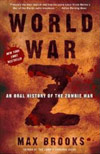March 2008
Monthly Archive
03/05/08 10:45 PM
Posted by acoleman under
booksNo Comments

I’d read Erik Larson’s Devil In The White City a couple years ago and found it to be one of those light little books that went down quickly, so when I ran across Thunderstruck at a thrift store one day, I decided to pick it up. Written in a similar style (nonfiction pulled from historical records and then flourished with a touch of imagination), it’s another breezy sort of read that again follows a man trying to achieve a scientific breakthrough (in this case Guglielmo Marconi) and another who was a murderer (Hawley Harvey Crippen).
That description might not sound breezy, and although the book is definitely a quick read, perhaps that’s not quite the right description of the book. “Pulpy” is probably more apt, as it moves with a sort of brisk thriller feel that you could easily imagine being made into a movie (think something along the lines of The Illusionist). At any rate, Larson once again pulls intertwines the two stories in a way that at first doesn’t really make a whole lot of sense, but finally reveals the connection later on. The bulk of the book is alternately spent describing triumphs, setbacks, murder, marital breakdowns, a getaway, breakthroughs, capture (for Crippen), and ultimately a brief bit of success (for Marconi).
It’s one of those nonfiction titles that reads like a work of fiction, largely for the sometimes-flowery language that Larson uses. Definitely different than most recent nonfiction titles that I’ve read lately (in that it felt a lot more like entertainment than anything of real learning value), it was nonetheless a fun, quick read that I’d recommend to those looking for a good little potboiler (with a few nice historical references thrown in).
03/05/08 10:26 PM
Posted by acoleman under
books1 Comment

I stumbled across mentions of this book many moons ago after reading Freakonomics, but had it land in my lap as yet another Christmas present retrieved from my wishlist. In truth, it’s a little bit different that the aforementioned book, but somewhat similar in style. It’s certainly not a straightforward textbook, but instead Frank uses everyday examples of questions (most of which came from his students) to teach different concepts of economics.
Basically, it’s an excuse to learn a lot of random trivia while at the same time learning about how that applies to different economics principles. For example, in the supply and demand section of the book, a question is:
Why do new cars costing $20,000 rent for $40 a day, while tuxedos costing only $500 rent for about $90?
It’s all pretty basic stuff, and while some of the information in the book is certainly more enlightening than the aforementioned quote and answer, a lot of the knowledge in the book is sort of common-sense type of information paired with basic economic theory. At just over 200 pages, it’s a quick read, though, and if you liked Freakonomics, this might be worth a couple hours of your time.
03/05/08 10:05 PM
Posted by acoleman under
books1 Comment
 It had been almost two years since I’d read a work of fiction, so at the beginning of the year I figured I’d break that drought as soon as I could. People who know me probably realize (and sometimes wonder why) I have a rather odd obsession with zombies, and I figured that a fine way to get back into fiction was through a book about the undead. As luck would have it, I’d received Max Brooks’ World War Z off my wishlist as a Christmas gift (which made for some funny looks), so it made the decision easy.
It had been almost two years since I’d read a work of fiction, so at the beginning of the year I figured I’d break that drought as soon as I could. People who know me probably realize (and sometimes wonder why) I have a rather odd obsession with zombies, and I figured that a fine way to get back into fiction was through a book about the undead. As luck would have it, I’d received Max Brooks’ World War Z off my wishlist as a Christmas gift (which made for some funny looks), so it made the decision easy.
In short, this was the perfect first book for me to read this year. A quick read, it’s broken into short interview passages (almost identical to the style of Studs Terkel) with survivors of a massive global zombie outbreak that was somehow quelled. It hops all around the world, from a doctor who encountered “patient zero” to soldiers who fought in various battles to civilians that did their best to survive it all.
As with any zombie tale, one obviously has to overlook the scientific leaps of faith, but once you do World War Z actually reveals itself to be a well-researched book that touches on political, social, and environment concerns that have their own parallels with real-life situations (which is really the measure of any great zombie-story). Having recently read several books on different epidemics, the whole spread-of-infection angle seemed fairly plausible, and the book is not only funny at times, but downright creepy in places as well. Supposedly, the book is already being made into a film, and I honestly have to say I’m pretty stoked about that.


